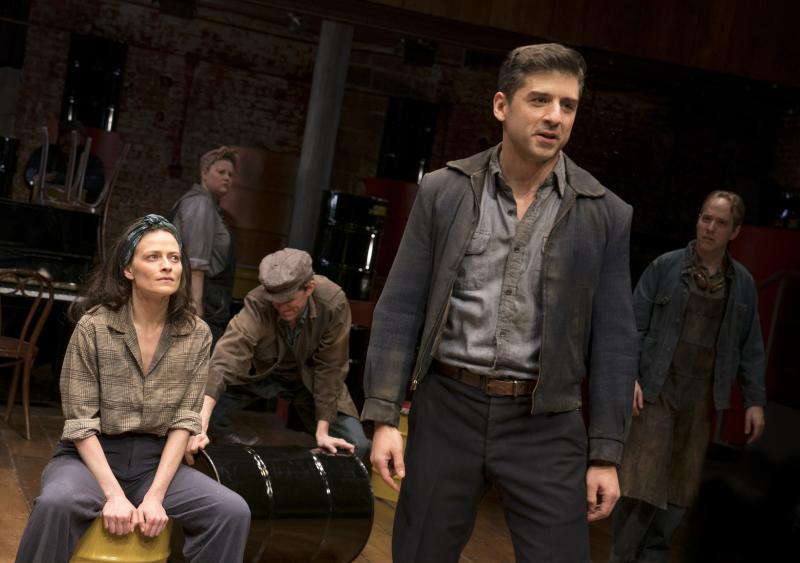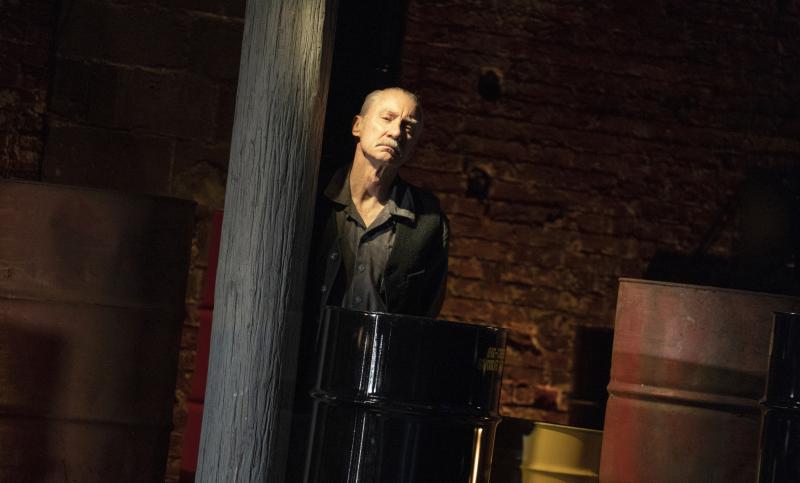Review: Dynamic Tony Yazbeck, Steely David Garrison Lead CSC's Revival of Marc Blitzstein's THE CRADLE WILL ROCK
In June of 1937, the United States government padlocked New York's Maxine Elliot Theatre and sent security guards to prevent the performance of a new musical, but the unknown leading lady Olive Stanton courageously fought her fears and led an act of defiance that made headlines the morning after opening night.

Tony Yazbeck and Ian Lowe (Photo: Joan Marcus)
That musical was The Cradle Will Rock, described by its 32-year-old author Marc Blitzstein as "a labor opera composed in a style that falls somewhere between realism, romance, vaudeville, comic strip, Gilbert and Sullivan, Brecht and agitprop."
With a plot criticizing corporate corruption designed to make money at the expense of the working class, it was accepted to open under the auspices of the WPA's Federal Theatre Project, with John Houseman producing and that young firebrand Orson Wells directing what was set to be an elaborate production with a full orchestra.
Stanton was cast as Moll, a destitute woman in a crumbling factory town who turns to prostitution as a way to keep from starving. She would introduce a devastating ballad, "The Nickel Under Your Foot," about the cruelty of optimism during dire times.
But word of the show's themes got around and rumors that the federal government was funding a musical that supported communism led to a withdraw of funding, officially announced as being due to budget cuts.
While Blitzstein, Houseman and Welles were scrambling to find a new theatre, both the actors' and musicians' unions noted that since the WPA was no longer producing the musical, their members would have to be signed to standard commercial contracts in order to stay with it. There was no money for that.
So when the nearby Venice Theatre was secured, the plan was to have Blitzstein, who was not a union member, just sit on stage at a piano and sing and narrate the show by himself. On opening night Welles kept ticket-holders gathered at the Elliot and then, assisted by many of the actors, paraded them to the Venice.
As far as what happened next is concerned, there's debate over how much was planned and how much was impromptu, but when Blitzstein began playing Moll's opening solo, Stanton surprised him by suddenly singing her part from her seat in the audience. Her brave decision to play her part from the house, never setting foot on stage, inspired her castmates to do the same, and they spent the night improvising their staging throughout the auditorium; some doubling up on roles with the author filling in for the rest. While the spirit of their union's restriction was defied, the letter of it, like the stage, remained untouched.
That legendary story of righteous defiance sometimes overshadows the fact that The Cradle Will Rock, on its own terms, is quite a revolutionary piece, and while not exactly part of the standard repertory, productions tend to pop up during times of social unrest.
For Classic Stage Company's sturdy revival, director/set designer John Doyle abstains from his frequent practice of stripping down the texts of deceased authors, as he did with the company's productions of ALLEGRO and CARMEN JONES, allowing Blitzstein's work to speak for itself.
He does add an interesting interpretive concept. Before the performance begins, the ensemble of ten actors (four of whom will switch off at playing the piano score when they're not in scenes) gathers in groups to chat with each other in the theatre's playing area, surrounded arena style by the audience on three sides.
Designer Ann Hould-Ward has everyone dressed as factory workers, and the only set pieces used are metal salvage drums, stacked and arranged to suggest locations, giving the impression that the performance may be part of a morale-boosting union meeting.

Set in Steeltown USA, where the economy is generated primarily from the factory owned by the wealthy Mr. Mister (cold and steely David Garrison), the piece opens with Moll (Lara Pulver) being arrested for prostitution after not offering a cop a freebie. At another part of town, police are anxious about a speech being given at a rally that night by labor leader Larry Foreman (Tony Yazbeck) and Moll is soon joined in the night court holding area by the members of Mr. Mister's union-bashing Liberty Committee, mistaken for labor protestors and arrested.
Better known for dancing roles in musicals like ON THE TOWN and PRINCE OF BROADWAY, Yazbeck displays dynamic acting chops here as the tough and unbreakable leader, selling his colleagues on a dream of union-made security as he belts the musical's title anthem.
But first he's seen as the sad and weary former businessman Harry Druggist, who suffered personal tragedy at the hands of Mr. Mister and, now homeless, gets arrested regularly for loitering. Harry explains to Moll how the Liberty Committee members are the real prostitutes, as we see in a series of vaudevillian and musical comedy flashbacks.
Mr. Mister strong-arms Editor Daily (Ken Barnett) into slanting his newspaper's reporting against the union and has Dr. Specialist (Eddie Cooper) lie about the cause of a worker's injury.
Sally Ann Triplett plays his wife, Mrs. Mister as a daffy socialite. While her husband disdainfully drops money at the feet of those who do his bidding, Mrs. Mister gleefully tosses it in the air like confetti as she donates generously to her church only when Reverend Salvation (Benjamin Eakeley) delivers sermons about the war in Europe, supporting whatever position most benefits the price of steel. She also personally funds a painter (Rema Webb) and a musician (Ian Loew) in exchange for their influence in the artistic community.
Blissfully living a life of leisure are their jazz-baby children, Junior Mister (Cooper) and Sister Mister (Kara Mikula).
Though there's the occasional lack of tension that makes the 90-minute production tend to lag at times, individual performances are quite good, and the climatic confrontation when Mr. Mister tries bribing Larry Foreman to get the workers to cooperate is fiercely played. Imagine the impact the scene must have had on Depression-era audiences during the height of America's Labor Movement.
The moment is set up beautifully by Webb, playing the wife of an injured worker who is left financially dry as revenge for his union involvement. Her tense and deliberate rendition of "Joe Worker Gets Gypped," is like the lit fuse that slowly approaches the dynamite.


